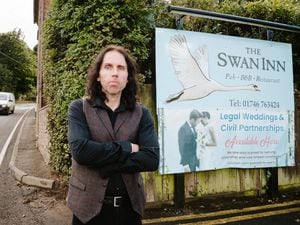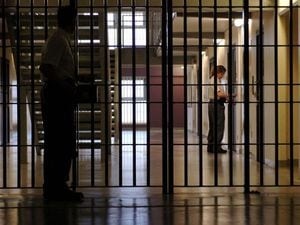Shropshire welcomes home a Dame fine lady
In 1962, Dame Stephanie Shirley set up a technology company with just £6. When her company peaked in the 1980s, it was worth £150 million and she became the 11th-richest woman in the UK and one of Britain's top women tycoons.
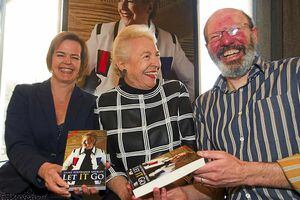
Now aged 81, she is perhaps best known for giving away much of that fortune. And it is her childhood in Shropshire, and the influences it has had on her life, that led her on the path to becoming a philanthropist. She explained how, as she gave a talk on her life as part of Oswestry LitFest.
Dame Stephanie arrived in Britain as an unaccompanied child refugee a few weeks before the outbreak of the Second World War. She grew up in Oswestry and received her secondary education at Oswestry Girls High School, later recalling: "In Oswestry I had six wonderful years of peace."
She went on to found the computer software company F.I. Group and her team's projects included programming Concorde's black box flight recorder.
The full house listening to her talk about her memoirs, Let It Go, at the town's Lion Quays Hotel were delighted to hear this formidable woman credit her childhood in the town as being one of the factors that has led to her giving away more than £50 million to good causes after she retired at the age of 60.
Dame Stephanie said: "When I wrote my memoirs my publisher was confused. Was it a story of a refugee or of the founder of a company or the mother of an autistic child or as a philanthropist? The truth is I'm all of those.
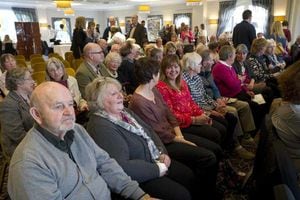
"My father was a Jewish judge in Dortmund. Shortly after my birth he was fired by the order of the Third Reich. My parents did a very brave thing sending me on the kinder transport thinking never to see me again, and that is an extraordinary thing to think about with parental love. My mother did the most loving thing she could do which was to let me go and let someone else look after me. Very few countries would take us in. There was a train of 1,000 children aged five to 16 and some babies which were looked after by the 16-year-olds. I was one of the youngest in the train. I was five and I came over with my sister who was nine.
"The 16-year-olds were really too old for the train, but they had struck some sort of deal with the Nazis to allow them to go as long as they returned. I didn't know it then, but they were returning to what they must have known was almost certain death.
"I arrived in July 1939, stateless penniless and without a word of English."
Young Stephanie was fostered by a couple which she called Uncle and Aunty and lived in Oswestry, first in Ferrer Road, then Hampton Road, and then Oakhurst Avenue.
When she was 12 she started at Oswestry Girls High School, where she discovered a love of maths and science.
She said: "We remained fundamentally poor. It became very clear to me that if I wanted to escape from poverty then doing well at school was essential. At school I was taking great pleasure in maths. I wasn't much good at some other things like sport or French, but science and maths were easy for me and I looked forward to them.
"I also loved going to Oswestry Library where I could borrow every book under the sun."
During her visit to Oswestry, Dame Stephanie took a walking tour to revisit some of the places she used to know well, including the site of her old school and the Victoria Rooms, both of which are now apartments.
"Oswestry is an exceptional town, as its residents must know. It's grown in last 60 years. It's less Welsh than it used to be," she said. "We were just children and we were welcomed, and I hope it is the same now. I've been so grateful to Oswestry. "
The welcome she received in Oswestry changed the course of her life.
"I am only alive because so long ago I was helped by generous strangers," she said. "The Quakers organised the train and paid Aunty and Uncle some money every week. I do thank all the uncles and aunties that helped us through those terrible times."
But her desire to help others was also guided by her son, Giles, who was severely autistic and died when he was aged 35 after an epileptic fit.
She said: "In between his bouts of what I can only describe as ghastliness, he was a charming innocent child who loved jigsaws and pussycats. We miss Giles terribly but it is a relief not to have him survive us.
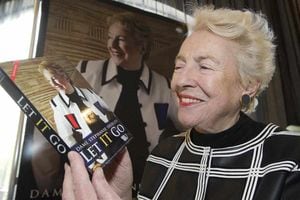
"There is no right or wrong way to endure the pain, but autism has become an ongoing concern. I set myself a target of having enough to look after Giles. That was £10 million, and that was the first time I really took an interest in money."
Now Dame Stephanie spends her time donating her money and time to good causes, particularly those to do with autism and IT.
"I believe giving is a social and cultural act, not only a financial one," she said. "In giving to make a difference I try to make it a committed act of love. Giving had given meaning to my life, the life that was saved.
"But I find it demeaning to just give money. Anyway, one wants the adrenaline buzz, the fun of commitment. I hope I can encourage more to follow my example. The wealth I've created is a responsibility and I try to exploit it in a positive way.
As a child I remember being told to give away my pocket money. Now I'm proud to have given away enough – £57 million to date –- to take me out of the Rich List. I feel much more fulfilled giving away money than I ever did in the years I was making it, and I enjoyed those."
The evening was the final event in this year's Oswestry LitFest. Founder John Waine said: "It is an extra special event to have one of the pioneers of business and IT, Oswestry-educated, come back home and go full circle and share her story."

